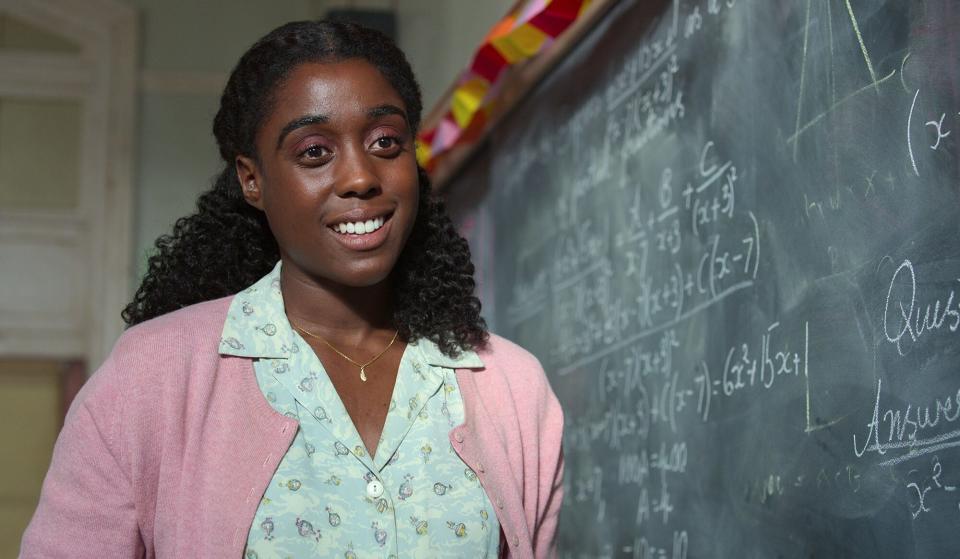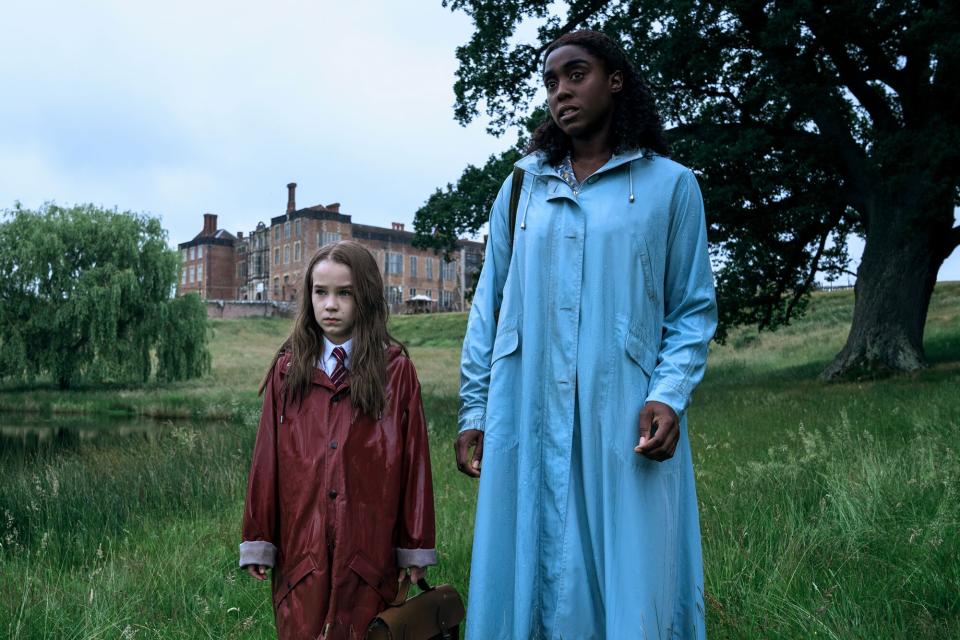Lashana Lynch on discovering that Matilda 's Miss Honey is a queer icon

- Oops!Something went wrong.Please try again later.
- Oops!Something went wrong.Please try again later.
For many LGBTQ fans of Matilda, the kindly Miss Honey signaled a queer awakening.
But Lashana Lynch had no idea that was the case when signing on to play the primary school teacher in Netflix's film adaptation of stage show Roald Dahl's Matilda the Musical.
"It wasn't something I was aware of until I saw some comments on social media and I thought, 'Oh my gosh, this is a revelation to me,'" she tells EW of uncovering this corner of Matilda fandom.
She then turned to one of her friends for more information. "One of my queer friends said to me after I got cast, 'Oh my gosh. She was like my gay icon when I was growing up,'" Lynch recounts. "And I was like, 'Tell me more. What did you see? What was it? Do I need to be aware of anything?'"
Undoubtedly, the actress in the 1996 film, Embeth Davidtz, brought a specific energy to the role that queer audiences latched onto. But Lynch says she thinks there's also something unique to Miss Honey that makes her a point of connection for people.
"When there's a character that is beloved, that represents everything to you and can speak to all people, all races, all sexes, all walks of life, then that is the perfect character," she reflects. "You don't have to do anything else apart from just being, and every community is going to get what they need from this one person. That's really special. That's a secret weapon. If you can have a character like that in every film or every play or every book that everyone from every walk of life can take something from."
"It's really special," Lynch concludes. "I never knew, but I'm glad."
Ahead of the movie's release on Netflix on Christmas day, we spoke with Lynch about starring in her first musical, singing live on set, and why she loved Matilda growing up.

Dan Smith/Netflix
ENTERTAINMENT WEEKLY: We've never seen you in a musical before, but was that something you grew up doing? Have you always been a singer?
LASHANA LYNCH: I grew up singing and acting separately. Musicals came later in life. The appreciation came from watching musicals throughout school and drama school and learning more about it. But no, I never envisaged being a part of a musical at all, so it was a complete surprise.
How did this come your way then?
I got a call from my agent saying that [director] Matthew Warchus wanted to hear me sing an iconic Miss Honey song from the musical. I was confused as to how they'd thought of me and why. I haven't sung in a long time, even though I sang before I acted. Not many people in the industry know that. I sent a voice note of me singing in my house, and then that turned into a Zoom to discuss the role. And then I went in and sang in a glass COVID-safe box. Then he called me directly to offer me the role, which was wonderful. It all happened really fast, but it was wonderful. It caught me by surprise.
Had you grown up with Matilda or Roald Dahl at all?
Yes. Matilda was one of my favorite books. James And The Giant Peach was also. I loved the film as well. I watched it back to back, and Matilda was one of the books that I reread as a child. There's specific books that you reread, and that was definitely one of them. I was Matilda in my head. Miss Honey was my queen in shining armor (laughs). As she was for many people. I really enjoyed the storytelling and how adventurous the detail was in the storytelling and the escapism, which is exactly what I was looking for as a child. It rang true to me. A lot of things have taken me by surprise, even speaking about this role to you, because this is a childhood fave. It's like watching Disney princesses as a child and then becoming a Disney princess. When would you ever imagine it?
It sounds like you were a true bookworm.
I wouldn't say that I read everything under the sun, but I enjoyed diving into the mind of books rather than sitting down and reading. I enjoyed more feeling the story inside and wanting to return to that level of escapism after school and on weekends; whenever I got a chance to be able to dive into another world, which is what Matilda was for me.
Well, Roald Dahl also doesn't treat children with kid gloves. People are genuinely terrible in his stories. But what is it like playing the character that is the antithesis to that?
I'm of the belief that young minds are always more advanced than we think they are. And children are such sponges and have such openness of mind and of belief that to speak to them as children sometimes feels a little counterproductive when they understand so much or have the possibility to do so. The fact that Roald Dahl just spoke to them like human beings seemed as though it was advanced, but really he was just doing what a lot of young people call out for. Just talk to us like a human being, and we can do normal human being things. It's beautiful to be able to play someone like Miss Honey who sees children as human beings with the potential to be even bigger and more fantastical and amazing human beings when they're older. But at their tender age, they're able to accomplish so much. It's nice that he's written that for young people and that we've grown up with his words being able to think bigger for ourselves. That's one thing that I've taken away from his books as a child — our brain can be as expansive as we want it to be.
You've really been kicking butt on screen between Captain Marvel and No Time to Die. Did this feel slower or challenging in a different way since it's not stunt-driven?
I had been manifesting a role like Miss Honey without knowing that it would appear as Miss Honey for many, many years. I wanted something subtle to show range, to show vulnerability, deep emotion, and to really teach the world, through my work, where strength comes from. Where a woman's strength comes from, and where a Black woman's strength comes from. To be able to do that in the most subtle way through a character who is really finding her way in life through children is not something that I ever would've imagined doing. But it is perfect for what I had in mind. To be able to go from roles that are so strong like Maria Rambeau or Nomi. They all are characters that we are going to love for a long time, but they also encourage young people to aspire to something that is sometimes beyond them. That's not to say that you can't be a fighter pilot or a secret agent or a member of an army. You can absolutely do that. But we also need to show the world that you can do that through vulnerability. You can do that through finding yourself on the way to finding what you want to do in life. Miss Honey is a nice example of reminding the world that strength is sometimes hard to come by, and sometimes in order to get it, you have to go through the most unorthodox routes. But when you do get there, you find a garden of inspiration and happiness and releasing of trauma and things that are holding you back from being your higher self.

Dan Smith/Netflix
The casting makes Trunchbull's abuse of Miss Honey more complex and insidious because you are a Black woman. Was that something that you and Matthew and Emma Thompson discussed at all?
The good thing about remaking a film is that the story is going to always remain the story. When there's something that needs to change because of sex or race, then you have great discussions about it and you handle it. But one amazing thing that Matthew did was not discuss race. We didn't need to, because we are teachers and students in a film — human beings just being human beings. That's one beautifully subtle way of normalizing the humanization of Black women on screen. You just put them on screen and tell the story. Cast the people you want, and if they happen to be Black, then the character happens to be Black. Let the audience determine for themselves how and what they want to take from the character's race. But it doesn't need to be a conversation. I love that it wasn't with her and with the students. They were just seeing light and inspiration from this wonderful human being who saw them as human beings. That's exactly how we need to treat Black women in cinema.
What would you say was the most challenging aspect of this? Was it the singing?
It's between the singing and being in a heightened state of anxiety for months playing Miss Honey. Her being in the mental state that she's in for so long was a real challenge. I always want to discuss mental health. It's really important to me to discuss that amongst young people as well. It was a great opportunity to let that live comfortably in this story. The singing I sang before I acted, so I was half comfortable. But also we sang live. We sang live every single note, on set every day. Weather conditions, how you feel in the day, moving around, singing to children, reminding yourself that this is an inspirational story — there's a lot to contend with when singing live. It took a lot of months of training to get my voice to the point where it was more than studio ready.
Would you want to do another musical?
I would love to do another musical at some point in life. I get itchy feet for new things really quickly. I've been in an action space for a while and wanted to slide out of that into something more vulnerable. Now I've done something vulnerable, a musical. I want to slide into something else that's going to challenge me. If I went onto a musical now, there would be some comfortability, which is the opposite of what I'm aiming for. But yes, at some point in life. For now, a little bit more discomfort would be fab.
Related content:

